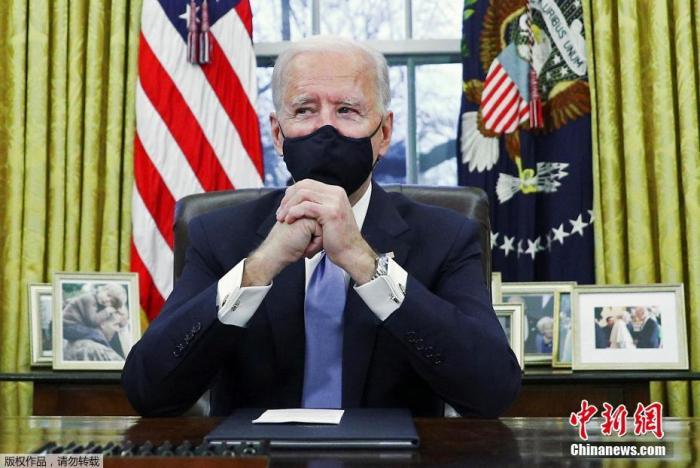China News Service, February 26 (Bian Lei) Everything seemed to happen suddenly.
On February 25, local time, U.S. President Biden, who took office just five weeks ago, suddenly ordered an airstrike against an Iranian-supported militia in Syria.
One shot is a "kill move".
The purpose of this US air strike is clear.
A Pentagon spokesperson pointed out that the airstrike was aimed at "retaliation" for the rocket attack "targeted at US and coalition personnel" launched by the so-called Iranian-backed militia organization recently.
The "lead" of the event has long been buried.
Data map: On April 14, 2018 local time, the U.S. Navy announced the launch of the Tomahawk cruise missile from the USS Monterey guided-missile cruiser, which launched strikes against several targets in Syria.
Returning to 10 days ago, on February 15th, Erbil, the capital of the Iraqi reservoir, was hit by several rockets, and it was the U.S.-led League of Nations station that suffered.
The incident caused the death of an employee of the League of Nations contractor, and many others, including the US military, were injured.
The senior U.S. government immediately expressed anger.
That night, US Secretary of State Blincoln said that he was "deeply angry" and said that he had contacted the Prime Minister of the Kurdish Region Government for discussion and promised to support all investigations and accountability actions.
US officials have also stated that the US will "respond at a time and place of its own choosing."
This week, the incident has made new progress.
The Pentagon stated that Iraq is in charge of the investigation and stated that "it is still uncertain who is behind the attack and what organization is it." The United States also "does not intend to learn more about the tactical details of the use of weapons."
But when we have more information, we will take action.
On the other hand, Iran has also clarified its relationship with the organization that launched the attack.
But just after this point in time, the United States immediately launched an air strike.
Data map: US President Biden.
In this operation, the United States seemed quite sure of the target of the air strike.
US Secretary of Defense Austin said: "I am very confident in the targets of our air strikes, and we know what we are going to attack." He also said that he has the key information that the organizations that previously attacked the US military in Iraq are using these facilities. Confident; and said that he had recommended Biden to take this air strike.
According to the latest news, the air strikes have killed 17 so-called militants supporting Iran.
However, the U.S. air strikes immediately attracted criticism.
Mary Allen O’Connell, a professor at the University of Notre Dame School of Law, criticized that the US action violated international law.
"The Charter of the United Nations clearly stipulates that the use of military power on the territory of a foreign sovereign country is legal only when the defending country is under armed attack and the target country is responsible for it."
On the other hand, the US media pointed out the internal reasons for the Biden administration to launch this military operation.
The Associated Press pointed out that the US move does not seem to be intended to expand military intervention in the region, but merely to show the willingness of "the United States to defend the US military in Iraq."
According to the New York Times, the Biden administration has acted more cautiously than the Trump administration.
When announcing the airstrike, John Kirby, the chief spokesperson of the Pentagon, said, "This operation sends a clear message: President Biden will take action to protect American personnel and coalition personnel. At the same time, our actions are well thought out. Yes, the purpose is to ease the overall situation in eastern Syria and Iraq."
CNN further pointed out: "Washington and Tehran are preparing to negotiate on the Iranian nuclear agreement when the United States launched this airstrike in Syria. This move by the United States may further complicate the already fragile negotiation process. "
Since Biden took office, Iran has frequently shouted to the United States, hoping that the United States will lift sanctions against Iran and return to the Iran nuclear agreement. However, the United States has not agreed to lift the sanctions as a prerequisite and rejected Iran's request. The two sides have obvious differences.
On the other hand, the International Atomic Energy Agency and the Iranian Atomic Energy Organization issued a joint statement on the 21st stating that the two sides have reached a temporary technical agreement. The IAEA can continue to carry out necessary supervision and verification work on Iran, but Iran will suspend voluntary implementation of the additional protocol.
Iranian President Rouhani stated on February 24 that Iran hopes to maintain the comprehensive agreement on the Iranian nuclear issue, but the current key depends on whether the United States stops its "economic terrorism" policy against Iran.
US State Department spokesperson Price responded that the United States' patience with Iran is "not unlimited."

